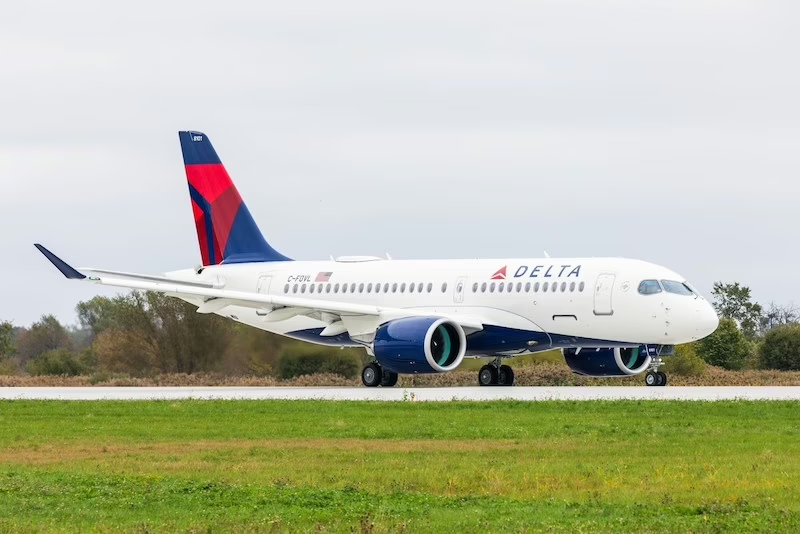
Delta Air Lines’ rebuild of its core hubs is advancing, with growth focused in Atlanta.
At its coastal hubs—where the carrier ramped up a presence last year—Delta says it is leveraging facility investments and progressively improving margins.
“Our domestic rebuild has, as we’ve spoken about earlier, initially focused on the coastal gateways and right now is moving back into the core,” said President Glen Hauenstein on a July 13 second-quarter (Q2) earnings call. “So we have the lapping of the investments we’ve made in the coastal gateways coming out of COVID now producing very good returns for us as well as the investments in the core.”
In December remarks to analysts, Hauenstein described the airline as being able to “take advantage of a generational opportunity to solidify our position in our coastal gateways,” including Boston, Los Angeles, New York LaGuardia and Seattle—without which, he noted, Delta’s opportunity for growth would have been “somewhat limited.” During a Q1 earnings call, he said the airline’s core hubs were less restored than coastal gateways.
In Q2, domestic passenger revenue increased 8% year-over-year on similarexpansion in capacity, while overall international passenger revenue grew 61%, led by the transatlantic and Latin American markets. Delta expects domestic and international capacity growth to begin evening out in the year ahead.
“While capacity trends down as we head out of restoration into a more normal growth cycle, I think you’ll see a pretty even distribution between domestic and international as we head into ’24,” explained Hauenstein. “We really haven’t given any guidance on that yet, and internally, we haven’t even completed our ‘24 plan yet, but I would expect it to be very similar, split between domestic and international.”
During the Q2 call, executives also expressed optimism on corporate bookings, despite the “propensity to travel [being] directly related” to worker flexibility, as they noted an uptick in return-to-office policies.
“All these comparisons in terms of corporate travel unfortunately are still on May 2019,” said CEO Ed Bastian. “And we lose sight of the fact that our economy is 20%—plus or minus—larger than it was in 2019... there is a lot of room to improve for corporate America on travel. I think that’s part of why we think you’re going to continue to see some steady improvement here this fall, and you’re hearing it from the travel managers as well.”
In Q2 the airline reported record quarterly operating revenues of $15.6 billion, up 13% year-over-year on a 6% increase in operating expenses to $13.1 billion. The airline posted a record operating income of $2.5 billion, up 64%, and a net income of $1.8 billion, versus the year-ago quarter’s $735 million.
Premium revenue growth continues to outpace revenue from Delta’s main cabin, increasing by 25% year-over-year versus main-cabin growth of 18%. Delta’s Premium Select offering is now available on over 80% of its widebody fleet. A fleetwide rollout of free onboard Wi-Fi is ongoing but could be delayed in some international markets due a satellite incident with provider Viasat.
That company on July 12 announced an “unexpected event” with a recently launched broadband communications satellite could materially affect performance, but would not impact current service from other satellites already in place. Delta has targeted the end of 2024 for equipping all its international flights with the complimentary offering.
“Obviously, we were [as] disappointed as Viasat was with the news yesterday, but we’re committed long term and they will get through this,” said Bastian. “We see no meaningful impact to where we stand currently with our domestic capacity, and we’re working closely with them to make sure the domestic performance maintains what we’ve been seeing, which has been great. I think if anything, it may cause a delayed rollout on some of the international markets. But it’s too early to tell.”
The carrier took delivery of 12 aircraft in Q2, and has exercised an option to purchase 12 additional Airbus A220-300s, which was announced by the OEM on July 13. The additional dozen brings firm orders for A220s to 131: 45 A220-100s and 86 -300s, including 61 already delivered, according to Aviation Week’s Fleet Discovery database. Delta also added one A330-900 to its orderbook during the quarter.
The airline projects Q3 total revenue to be similar to Q2’s, and up 11-14% when compared to Q3 2022. With a capacity outlook of 16% growth, the airline expects unit revenues to be 2-4% lower for seasonal reasons and because of “tougher international comps as we lap the removal of restrictions,” noted Hauenstein. But the airline is “firmly on track to exceed the $6.5 billion target for this year.” .
Delta raised its 2023 earnings guidance to $6-7 per share, up from a previous guidance of $5-6.
